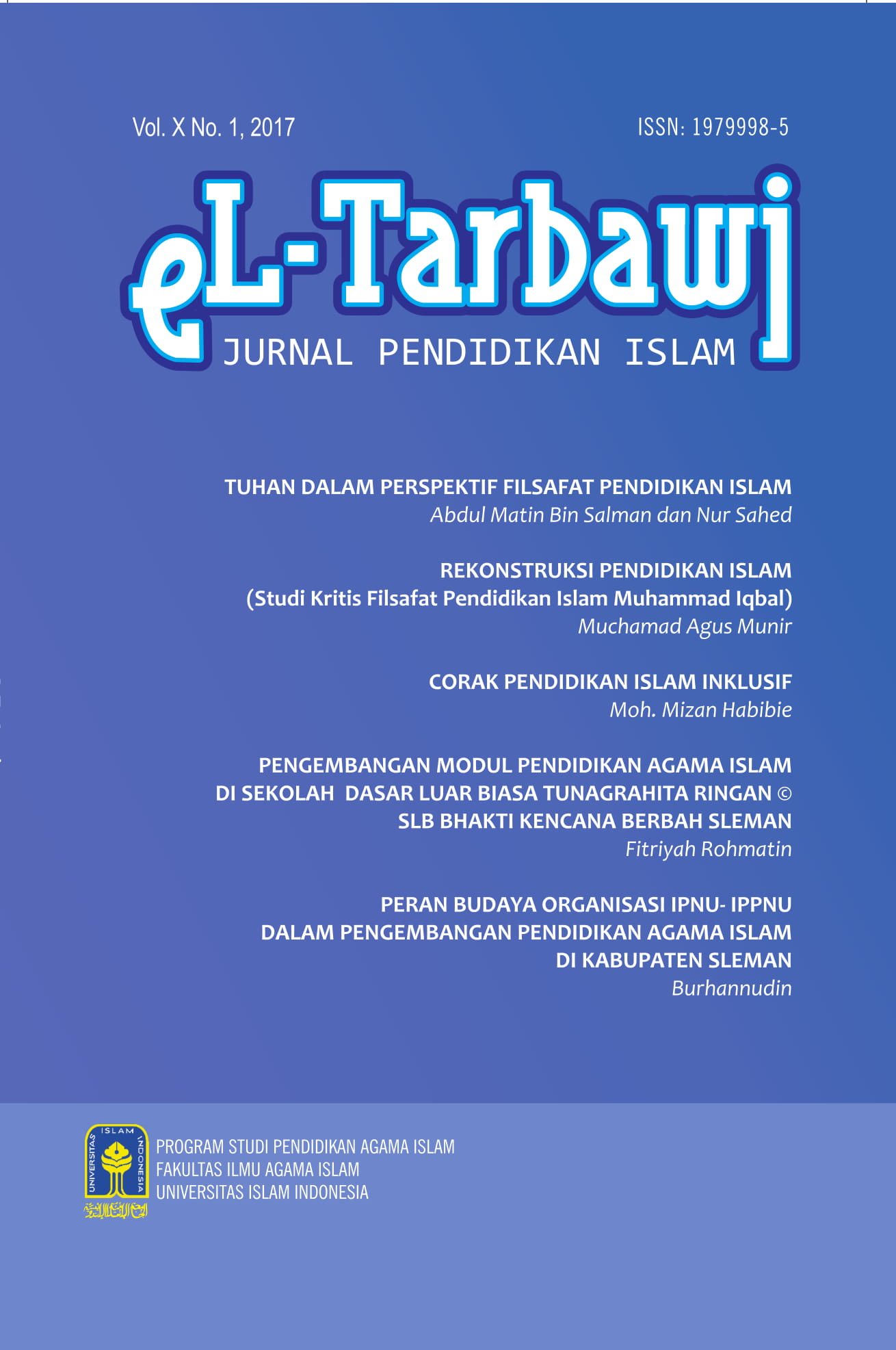Main Article Content
Abstract
Islamic education is an effort to introduce a man to his God, to be more aware of the basic potentials and tasks in this world. This study concludes that Islamic education is essentially the source, the basis and the purpose of the God itself. God becomes the focal point of all the development of Islamic education. However, God as a center of Islamic education is often interpreted as a Theocentric belief, which neglects the humanity, so Islamic education only produces humans who are pious in private (hablum min Allah) but weak in social piety. So, there must be a comprehension of anthropocentrism, by which the unity of God has implications for the awareness of human values. This way, Islamic education, in the end, will give birth to humans who are pious privately and socially.
Keywords: God, philosophy, Islamic education
Article Details
Authors retain copyright and grant the journal right of first publication with the work simultaneously licensed under a Creative Commons Attribution (CC-BY-SA) 4.0 License that allows others to share the work with an acknowledgment of the work’s authorship and initial publication in this journal.
References
- Achmadi, 2005, Ideologi Pendidikan Islam Paradigma Humanismeteosentris, Yogyakarta, Pustaka Pelajar.
- Al-Attas, Syed Muhammad Al-Naquib, 1992, Konsep Pendidikan Dalam Islam: Sebuah Pembinaan Filsafat Pendidikan Islam, Terj. Haidar Bagir, Cet. IV, Bandung, Mizan.
- Al-Faruqi, Ismail R, 1984, Islamisasi Ilmu Pengetahuan, Bandung, Pustaka.
- Al-Qardhawi, Yusuf, 1994, Karakteristik Islam Kajian Analitik, Terj. Rofi’ Munawwar, Tajuddin, Surabaya, Risalah Gusti.
- Al-Syaibani, 1979, Filsafat Penidikan Islam, Terj. Hasan Langgulung, Jakarta, Bulan Bintang.
- Arif, Mahmud, 2008, Pendidikan Islam Transformastif, Yogyakarta, LkiS.
- Azra, Azyumardi, 2002, Pendidikan Islam Tradisi Dan Modernisasi Menuju Millennium Baru, Jarakta, Logos.
- , 2012, Pendidikan Islam Tradisi Dan Modernisasi Di Tengah Tantangan Milenium III, Jakarta, Kencana.
- Husaini, Adian, et. Al. 2013, Filsafat Ilmu Perspektif Barat Dan Islam, Jakarta, Gema Insani.
- Kartanegara, Mulyadi, 2005, Integrasi Ilmu Sebuah Rekontruksi Holistik, Bandung, Mizan.
- Langgulung, Hasan, 1968, Manusia Dan Pendidikan Suatu Analisa Psikologi Dan Pendidikan, Jakarta, Pustaka Al Husna.
- Maksum., 1999, Madrasah Sejarah dan Perkembangannya, Bandung, PT Logos Wacana Ilmu.
- Mas’ud, Abdurrahman, 2002, Menggagas Format Pendidikan Nondikotomik; Humanisme Religious Sebagai Paradigma Pendidikan Islam, Yogyakarta, Gama Media.
- Muhaimin, 2012, Paradigma Pendidikan Islam Upaya Mengefektifkan Pendidikan Agama Islam di Sekolah, Bandung, PT Remaja Rosdakarya.
- Nasr, Seyyed Hossein, 1981, Islam Dalam Cita Dan Fakta, Terj. Abdurrahman Wahid, Jakarta, LEPPENAS
- , 2003, Antara Tuhan, Manusia, dan Alam, Terj. Ali Noer Zaman, Yogyakarta, IRCiSoD.
- , 2003, The Heart of Islam: Pesan-Pesan Universal Islam Untuk Kemanusiaan, Bandung, Mizan.
- Nata, Abuddin, 2005, Filsafat Pendidikan Islam, Jakarta, Gaya Media Pratama.
- Rahman, Fazlur, 1995, Membuka Pintu Ijtihat. Terj, Anas Mahyuddin, Bandung, Pustaka.
- Suharto, Toto 2011, Filsafat Pendidikan Islam, Yogyakarta, Ar-Ruzz Media.
- Syaikh Az-Zarnuji. 1995, Ta’limul Muta’allim Tariqattta’allum, Terj. Pene Abdul Kadir Aljufri, Surabaya, Mutiara Ilmu.
- Syihab, Quraish, 2002, Membumikan Al-Qur’an, Bandung, Mizan.
- Tafsir, Ahmad, 2010, Filsafat Pendidikan Islam Integrasi Jasmani, Rohani Dan Kalbu Memanusiakan Manusia, Bandung, PT Remaja Rosdakarya.
- Zubaedi, 2012, Filsafat Pendidikan Islam Dan Kapita Selekta Pendidikan Islam. Yogyakarta, Pustaka Pelajar
References
Achmadi, 2005, Ideologi Pendidikan Islam Paradigma Humanismeteosentris, Yogyakarta, Pustaka Pelajar.
Al-Attas, Syed Muhammad Al-Naquib, 1992, Konsep Pendidikan Dalam Islam: Sebuah Pembinaan Filsafat Pendidikan Islam, Terj. Haidar Bagir, Cet. IV, Bandung, Mizan.
Al-Faruqi, Ismail R, 1984, Islamisasi Ilmu Pengetahuan, Bandung, Pustaka.
Al-Qardhawi, Yusuf, 1994, Karakteristik Islam Kajian Analitik, Terj. Rofi’ Munawwar, Tajuddin, Surabaya, Risalah Gusti.
Al-Syaibani, 1979, Filsafat Penidikan Islam, Terj. Hasan Langgulung, Jakarta, Bulan Bintang.
Arif, Mahmud, 2008, Pendidikan Islam Transformastif, Yogyakarta, LkiS.
Azra, Azyumardi, 2002, Pendidikan Islam Tradisi Dan Modernisasi Menuju Millennium Baru, Jarakta, Logos.
, 2012, Pendidikan Islam Tradisi Dan Modernisasi Di Tengah Tantangan Milenium III, Jakarta, Kencana.
Husaini, Adian, et. Al. 2013, Filsafat Ilmu Perspektif Barat Dan Islam, Jakarta, Gema Insani.
Kartanegara, Mulyadi, 2005, Integrasi Ilmu Sebuah Rekontruksi Holistik, Bandung, Mizan.
Langgulung, Hasan, 1968, Manusia Dan Pendidikan Suatu Analisa Psikologi Dan Pendidikan, Jakarta, Pustaka Al Husna.
Maksum., 1999, Madrasah Sejarah dan Perkembangannya, Bandung, PT Logos Wacana Ilmu.
Mas’ud, Abdurrahman, 2002, Menggagas Format Pendidikan Nondikotomik; Humanisme Religious Sebagai Paradigma Pendidikan Islam, Yogyakarta, Gama Media.
Muhaimin, 2012, Paradigma Pendidikan Islam Upaya Mengefektifkan Pendidikan Agama Islam di Sekolah, Bandung, PT Remaja Rosdakarya.
Nasr, Seyyed Hossein, 1981, Islam Dalam Cita Dan Fakta, Terj. Abdurrahman Wahid, Jakarta, LEPPENAS
, 2003, Antara Tuhan, Manusia, dan Alam, Terj. Ali Noer Zaman, Yogyakarta, IRCiSoD.
, 2003, The Heart of Islam: Pesan-Pesan Universal Islam Untuk Kemanusiaan, Bandung, Mizan.
Nata, Abuddin, 2005, Filsafat Pendidikan Islam, Jakarta, Gaya Media Pratama.
Rahman, Fazlur, 1995, Membuka Pintu Ijtihat. Terj, Anas Mahyuddin, Bandung, Pustaka.
Suharto, Toto 2011, Filsafat Pendidikan Islam, Yogyakarta, Ar-Ruzz Media.
Syaikh Az-Zarnuji. 1995, Ta’limul Muta’allim Tariqattta’allum, Terj. Pene Abdul Kadir Aljufri, Surabaya, Mutiara Ilmu.
Syihab, Quraish, 2002, Membumikan Al-Qur’an, Bandung, Mizan.
Tafsir, Ahmad, 2010, Filsafat Pendidikan Islam Integrasi Jasmani, Rohani Dan Kalbu Memanusiakan Manusia, Bandung, PT Remaja Rosdakarya.
Zubaedi, 2012, Filsafat Pendidikan Islam Dan Kapita Selekta Pendidikan Islam. Yogyakarta, Pustaka Pelajar
